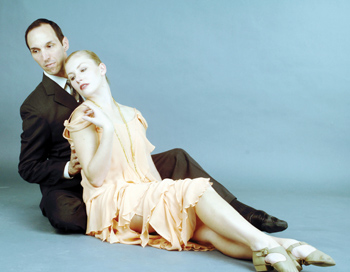![[Metroactive Stage]](/stage/gifs/stage468.gif)
[ Stage Index | Silicon Valley | Metroactive Home | Archives ]

Calling Dr. Phil: Mike Howerton and Alexsandra Meijer dance the famous troubled literary couple T.S. Eliot and Vivienne Haigh-Wood. Burning Bright Margaret Wingrove explores in dance the emotional fires of two pairs of famous poets and lovers By Marianne Messina IN CHOOSING music for her Sylvia and Ted in the program "Burning Every Moment," choreographer Margaret Wingrove has departed from the heady pianists, classical composers and romantic strings that mark much of her previous work. Instead, she sets this piece about the intense relationship between the poets Sylvia Plath and Ted Hughes to music by Janis Joplin. In rehearsal, after Wingrove underscores Plath's obsessive perfectionism, Matt Kovac and Lori Seymour enact a pivotal moment in the relationship—Plath comes across proof that Hughes is having an affair. As Seymour frantically tries to tidy up a table littered, at the moment, with dance gear, Janis pours out liquid soul from a boombox in that voice—"People call it 'whiskey breath,'" Wingrove remarks. Why Janis for Sylvia Plath? "She's kind of heart-wrenching when you listen to her," Wingrove comments. The same description could apply to Plath's life: the talented poet succumbed to mental illness and committed suicide at 30. Wingrove points out that Sylvia and Ted is "not about the oven," referring to the way Plath took her life, but "about the struggle for this very gifted person to have a normal life." For Wingrove, choosing Joplin's music was instinctual, a connection she sensed between the two artists. Joplin and Plath were more or less contemporaries, a fact worth highlighting, since "literary poets" are often associated with dusty libraries. In the early '60s, as Joplin sang in Texas bars, Plath went through her most prolific period. "Things are pretty intense in that time period," says Wingrove. She senses that both Plath and Joplin reverberate with similar intensity. For Plath, this period was also the most emotionally chaotic, and Wingrove delves right into the heart of it, remarking that "out of this chaos came this wonderful stream of poetry." As a choreographer, Wingrove found Joplin's music freeing: "If you have just regular concert music you are kind of following the notes or the rhythm, but this gives you more to do movement in between—spaces—it's the spaces in between that are really interesting." It all makes sense the instant Janis rolls out those rasping strains and you see Seymour and Kovac reach in movements desperate to connect. The relationship brings up questions about how those tragic details might have been altered. "There was a possibility that that didn't have to happen," she muses. The relationship "could have been a real supportive thing." The second half of the program, Tom and Viv, looks into an almost mirror-image relationship, between T.S. Eliot and his wife, Vivienne Haigh-Wood (Michael Howerton and Alexsandra Meijer). In this relationship, it is the poet, Eliot, who had "more of a cool, reserved temperament," while Vivienne "was effervescent and excited, was really his reason for writing." Vivienne goes the way of Plath into emotional illness, and again Wingrove explores the turmoil, which, she points out, also happens to coincide with one of Eliot's most prolific periods. In Tom and Viv, the earthy Joplin feel gives way to something "a little surreal." Wingrove treats us to steps interpreting Eliot's verse, setting The Hollow Men to Beethoven's Symphony no. 7, one of Eliot's favorites. "I heard the music, and right away I could have visions—it was just uncanny," Wingrove says. "I could see movement that went with this feeling of hollow men—gesture without movement, and color without shades." It seems that Wingrove is ever expanding, and not just in musical choices. Shas often shown the way volatile relationships ignite an artist's fire. This program promises to scratch more at the failures of relationships, the near-misses that slip off some crucial edge, with a simple, open "why?"
The Wingrove Company performs Thursday, Sunday at 7:30pm and Friday-Saturday at 8pm at the Stage, 490 S. First St., San Jose. Tickets are $20-$30. (408.283.7142)
Send a letter to the editor about this story to letters@metronews.com. [ Silicon Valley | Metroactive Home | Archives ]
|
From the January 4-10, 2006 issue of Metro, Silicon Valley's Weekly Newspaper.
Copyright © 2006 Metro Publishing Inc. Metroactive is affiliated with the Boulevards Network.
For more information about the San Jose/Silicon Valley area, visit sanjose.com.